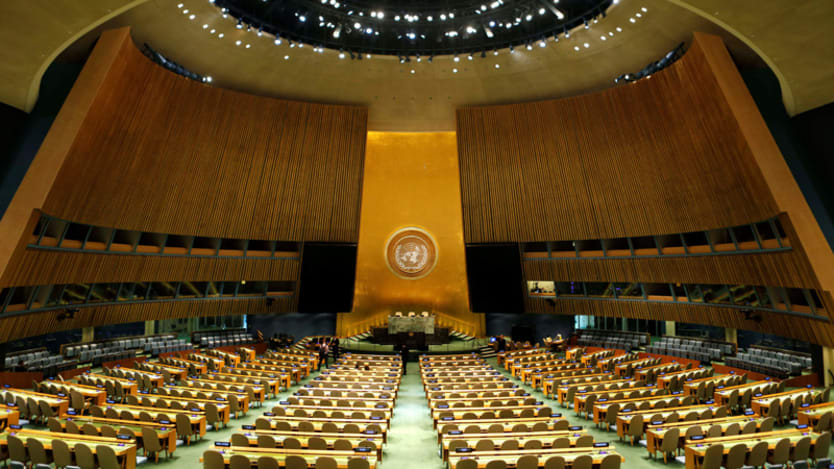
NEW YORK — There is not one easy, catch-all answer to achieving universal health coverage. But the upcoming high-level meeting on UHC during the opening of the U.N. General Assembly will likely fall short of fast-tracking progress, according to some civil society health experts.
The latest draft of the agreement, pledging to ensure health care access for all, lacks hard financing and monitoring commitments, said Justin Koonin, an advisory member of the Civil Society Engagement Mechanism for UHC2030, a civil society network of more than 450 organizations in 75 countries.
“This needs to be a deeply transformative moment because we are way behind and we are not going to get to UHC by 2030 unless something changes. It is a concern. It is looking more like business as usual and less like a transformative moment,” Koonin told Devex.
“We know that an extra 1% of GDP will not get us to achieving universal health coverage. In fact, for some countries the extra 5% will not be enough.”
— Amy Boldosser-Boesch, senior director of the FCI program at Management Sciences for HealthSpecific, concrete targets governments initially agreed upon in May have been “watered down” in the latest version of their agreement released in August, according to Amy Boldosser-Boesch, senior director of the family care international program at the global nonprofit Management Sciences for Health. Countries in support of the agreement will sign it during the Sept. 23 high-level U.N. meeting on UHC.
While the initial draft agreement pledged to “increase domestic public spending and expand pooling of resources allocated to health,” the new version — which will likely mirror the final agreement, according to Koonin — says governments will “ensure sufficient domestic public spending on health, and where appropriate, expand pooling of resources allocated to health.”
Governments initially pledged to spend at least 5% of their GDPs on health in the draft agreement. The agreement as it stands now asks that governments spend just 1% more on health “if necessary,” according to Boldosser-Boesch.
That proposed increase is not sufficient to impact change, she said. But financing is only one part of the challenge. Previous agreements such as the 2001 Abuja Declaration have called for a rise in health financing, but governments have not made good on their pledges.
“We know that an extra 1% of GDP will not get us to achieving universal health coverage. In fact, for some countries the extra 5% will not be enough,” Boldosser-Boesch said. “In other countries, they do already spend 5% or more on health, but they do not spend it well.”
The wording of the new UHC agreement matters, especially as civil society movements and platforms on UHC remain “nascent” in most countries, according to Koonin.
“The political declaration has the potential to kick off stronger UHC movements,” Koonin said. “There are some missed opportunities. Whether it is transformative or not will depend on the implementation.”
At least half of the world’s population do not have full coverage of essential health services, according to the World Health Organization. The numbers are higher among marginalized populations, according to Boldosser-Boesch. One key civil society request is UHC financing commitments to “leave no one behind,” she explained.
Mark your calendar. On Tuesday, Sept. 24, Devex is convening a day-long UHC Pavilion on the sidelines of the U.N. General Assembly in New York City, hosting a series of events focused on the critical topic of universal health coverage. Sign up for the livestream on UHC here.
“We know, for example, there are countries that are saying overall, our maternal mortality rate is not bad,” Boldosser-Boesch said. “But if you look at the situation of maternal mortality in the country amongst indigenous women, or those who are not appropriately reflected in the data, we know the rates are actually quite shocking.”
In the lead-up to the high-level meeting, meanwhile, some organizations have been releasing plans for new courses of action and partnerships to further work on the challenge.
The Global Fund to Fight AIDS, Tuberculosis and Malaria, for example, signed a new agreement with the Dutch nonprofit PharmAccess Foundation in May. The organizations are working to develop scalable UHC insurance models, based on access through mobile technology, to help countries deliver on HIV/AIDS, malaria, and TB services in four pilot countries: Kenya, Rwanda, Nigeria, and Ethiopia.
Each country requires an individualized approach to help all of its citizens access quality health care through a mix of public and private services, said Monique Dolfing-Vogelenzang, CEO of PharmAccess.
"Free health care, I think, worked in Cuba, but apart from that, we do not know many low- or middle-income countries that has done this successfully,” Dolfing-Vogelenzang explained, adding that technology can help deliver on affordable, accessible care.
“The marginal cost of reaching people has come down a lot. The power of technology has been more and more recognized,” she continued. “But then it’s about the how — there is a lot for those governments to deal with, like how to mobilize the required funding to achieve UHC in the reality of an economy with a large informal sector.”
For a closer look at the innovative solutions designed to push for progress on universal health coverage around the globe, visit the Healthy Access series.









